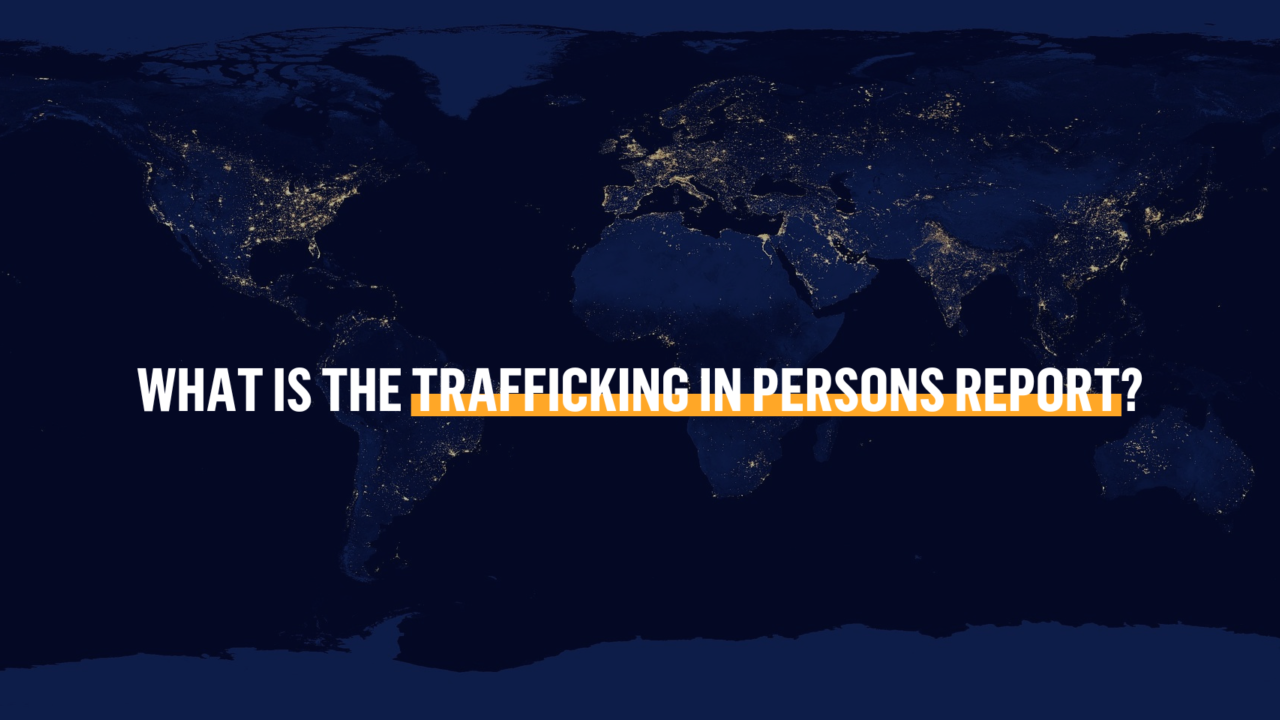What is the Trafficking in Persons (TIP) Report?
Human Trafficking
The Trafficking in Persons (TIP) Report is an annual status update on the state of global anti-trafficking efforts. Each year, the U.S. State Department’s Office to Monitor and Combat Trafficking in Persons (TIP Office) releases the report with individual grades and summaries outlining the progress made by countries around the world.
The TIP Office was established in 2001 by the Trafficking Victims Protection Act (TVPA). This momentous human trafficking legislation propelled the U.S. government’s response to the crime at home and abroad. The TVPA set global standards for eliminating trafficking and positioned the U.S. as a leader in the fight.
An estimated 50 million people are trapped in modern slavery today – that’s greater than the combined population of Texas and New York. Many people aren’t even aware that it is an issue. But despite being illegal, it is prevalent across the globe. That’s why it is so important we publicize the TIP Report and its findings.
Why is the TIP Report needed?
Currently led by Ambassador Cindy Dyer, the TIP Office sits at the center of the U.S. government’s anti-trafficking initiatives. Its two main functions are to:
- Release the annual TIP Report highlighting challenges and successes in the fight against trafficking.
- Administer program funding that supports and helps improve these findings by building sustainable capacity of governments and civil society to prosecute traffickers, protect victims and ultimately prevent trafficking.
The TIP Report sheds light on the current scale of modern slavery around the world. Think of it as a collection of report cards with grades based on factors like law enforcement effectiveness, criminal accountability, victim protection, government funding and more. Each country is graded on the strength and effectiveness of its efforts to end human trafficking within its borders.
What are the Trafficking in Persons Report Tiers?
- Tier 1: The equivalent of an A or B grade – nice job! Countries that receive a Tier 1 ranking are not necessarily free of trafficking, but they are considered to be fully aligned with the TVPA’s minimum standards to eliminate human trafficking.
- Tier 2: Like a C grade – good work with a few improvements possible. Countries designated as Tier 2 do not meet the TVPA minimum standards but are implementing substantial efforts to align and comply with the standards.
- Tier 2 Watchlist: A probationary-type grade, like a D, warning a country it has work to do. Countries are placed on the Watchlist when the U.S. government feels that their response to combat trafficking is not to scale with the levels of trafficking in the country. This rating can represent a decrease in the effective prosecution of traffickers, a lack of assistance and support to victims, or even a degree of government involvement in human trafficking. The following year, these countries must meet specific standards to ensure they are not downgraded to Tier 3 in the next TIP Report.
- Tier 3: The lowest rating, similar to a failing grade. Countries designated as Tier 3 fail to meet the TVPA’s minimum standards – and are also not making significant efforts to do so. At the determination of the U.S. President, Tier 3 countries may be restricted from access to nonhumanitarian, nontrade-related foreign assistance funding and participation in educational and cultural exchange programs. The President also has the power to instruct the U.S. representatives to the International Monetary Fund and other multilateral development banks to vote against and work to limit a Tier 3 country’s access to loans and other multilateral funds.
The TIP report is one of the most important diplomatic tools in the global fight to end modern slavery
The report allows us to know whether trafficking is improving or getting worse. In the countries actively fighting trafficking, it gives a sense of whether their strategies are effective. But unless policymakers review the findings, it will only be words on paper. We can't end trafficking without understanding where it is, why it happens and which solutions are making a difference.
This is where you come in.
Members of Congress are elected to represent the interests of their constituents – that’s you! You can use your voice to ensure this anti-trafficking tool gains the attention of policymakers and drives legislative action to end violence and exploitation around the world. Let your elected officials know that anti-trafficking and anti-slavery initiatives are important to you. Ask them to prioritize efforts to end it. Learn how you can join the fight today on our advocacy page.